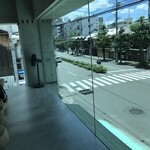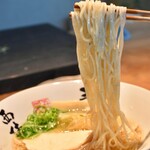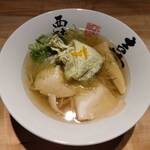
昆布と麺 喜一
Kombutomenkiichi
3.08
Imperial Palace Area
「Ramen」
--
1,000-1,999円
Opening hours: April 1 - Fully reserved 11:00 - 12:00 - 13:00 (10 seats each, 3 sections)
Rest time: Sundays Business hours and holidays are subject to change, so please check with the store before visiting.
京都府京都市上京区西五辻東町74-2 五辻の昆布 2F
Photos
(20)




















Details
Reservation Info
(on) a subscription basis
Payment Method
Credit cards accepted
(VISA, Master, JCB, AMEX, Diners)
Electronic money accepted
QR code payment available
(PayPay)
Number of Seats
10 seats
(8 seats at the counter)
Private Dining Rooms
None
Parking
having
Comments
(17)
lascaux
3.70
I went to a ramen restaurant that requires a reservation at Konbu-ya San. I made a reservation online at 12 o'clock and arrived early. The first floor had various konbu products for sale, so I wandered around to pass the time. When it was time, I went up to the second floor and sat at the counter. First, I listened to a talk about Rishiri konbu, Makonbu, and Rausu konbu, then tasted the three konbu waters that were brewed. I learned about the differences in taste and aroma depending on the type of konbu. After that, there was a demonstration of shaving oboro konbu, which we then ate. The "Konbu Ramen" for 1,152 yen was served, with toppings like bamboo shoots, chicken breast chashu, and oboro konbu, giving it a Kyoto-like feel. The soup had a light and deep flavor from the konbu broth, and the noodles were made with whole wheat flour using "Haru yo Koi" from Raamen Tohichi. I ate it smoothly, adding more oboro konbu halfway through. I finished by eating the one-bite rice ball and drinking up the soup. After eating, I bought a summer-limited new ginger salted konbu called "Rakusui" on the first floor, as it was made with konbu. It was a very enjoyable experience!




みずきの食事
3.90
Today's lunch was at "Konbu to Men Kiichi" in Kitano Hakubaicho. This place serves ramen only during weekdays for lunch, and it is by reservation only. You will be seated at the counter, where you will first have a tasting of different types of konbu: Rishiri konbu, Ma konbu, and Rausu konbu. Ma konbu and Rausu konbu have a stronger flavor compared to Rishiri konbu. Next, they explain the difference between tororo konbu and oboro konbu, and then shave oboro konbu in front of you for a taste test.
Then comes the main dish, the ramen. The broth is mainly made from konbu, without using salt or soy sauce, and various toppings are used to add flavor. The noodles are made with whole wheat flour and are medium-thin straight noodles. Toppings include chicken breast chashu, bamboo shoots, konbu, and chopped green onions. On the side, there is a rice ball topped with konbu, konbu and shiitake mushroom balls, and konbu jelly flavored with matcha. Towards the end of the meal, you can add the oboro konbu for a change in taste. It was a delicious meal. This place operates on a one-point purchase system, so I bought some konbu furikake to take home.




cayenne_pepper
3.50
It was more like a Japanese noodle dish than ramen, with a light taste and a hint of kelp flavor. The restaurant has 10 counter seats, and you can enjoy a lunch while learning about kelp from the staff. Even if you're not a fan of rich ramen, you can still enjoy this bowl easily.


おしゃ0911
4.60
This ramen restaurant operates with only three seatings per day (10 people each), by reservation only. Located on the second floor of the long-established kombu shop Gotsubashi, it is run by the same owners. Upon seating, guests are treated to a tasting of kombu water, where the differences between Rishiri, Makombu, and Laust are explained. The depth of kombu flavor is truly experienced. Next, there is a demonstration and tasting of shredded kombu, followed by the main ramen dish. Made with various dashi including kombu, the ramen is unlike typical Japanese broth-based ramen, as it contains no oil. While this may not be everyone's cup of tea when it comes to ramen, I found it to be impressively delicious. After the ramen, a small onigiri is served, along with engaging conversation with the owner, and a beautifully designed interior. The price is surprisingly low at 1,152 yen (including a purchase from the first-floor store), reflecting the owner's goal of spreading the deliciousness of kombu rather than making a profit. Amazing!




よしたんぺ。
3.80
Main! Completely reservation-only cute shop 🍀🀶 << #KonbuAndMenKiichi >> Kyoto, Kitano Hakuba-cho 🍀【#KonbuRamen】 ¥1152 + One Konbu system 1F Purchasing one item at Gotsubo in Gotsubo. ------《Store Information》------Address: 74-2 Higashi Gotsubo Nishigoji-machi, Kamigyo-ku, Kyoto, Kyoto Prefecture 2F of Gotsubo 🀦Business Hours: Completely reservation-only 11:00-12:00-13:00- 🄼 Closed on: Sunday 🀞Access: 1121m from Kitano Hakuba-cho️ Parking: Available Seats: 10 seats Payment: After payment ✂︎------------------------Arrival → 12:50 Seat → 12:55 Bowl → 13:20 (Mon)The new store opening on 4/1 is completely reservation-only! Located on the 2nd floor of Gotsubo in Nishijin, Kyoto, @konbu5224, where you can have a unique encounter with Konbu that makes you appreciate the value of Konbu and is full of Kyoto-like charm, is sure to be a hot topic in the future. I went to 【Konbu and Men Kiichi】 @kiichi5224. Reservations can be made from the above accounts. 1. Konbu water tasting. → Starting with a conversation about Konbu, such as the characteristics of Rishiri, Shin, and Rausu Konbu, and various discussions about the smell, color, taste, and use of Konbu, you can experience an interesting tasting of water. 2. Konbu and noodles. Noodles shaved in front of you and then ramen. → Shaving Shin Konbu in front of you, turning it into oboro Konbu. Used for flavor change in Konbu ramen. 3. Mini rice ball with Gotsubo Tsukudani from Gotsubo Gotsubo → A bite-sized mini rice ball is served to accompany the ramen. This is also delicious... I want to eat a big one 🍀A gentle soup that fully brings out the umami of the three blended Konbu 🍀No use of soy sauce or other seasonings, no use of animal products such as pork or chicken, no use of flavored oils, and using dried bonito flakes, dried squid, seafood, dried fruits, dried tomatoes, and tea leaves to make the soup with water extraction and adjust the salt content. Knockout soup with the scent of Konbu first and plenty of umami from Konbu dashi. The whole wheat noodles are thin and have a soba-like texture, making them delicious and easy to bite. Add shaved oboro Konbu in the remaining soup and enjoy even more Konbu flavor. It was a must-drink cup ❤️And when you finish drinking it, you'll understand the irresistible production for fans of Hachigo... Good Konbu for 1152 yen, advice from Michelin one-star restaurant, Ginza Hachigo, and the use of special order noodles from Men and Women Tōhichi, and the taste is delicious, and I learned how to make Konbu water in a delicious and enjoyable way. It seems that tsukemen will be served in some form in the future, so I would like to visit again if I have the chance! For now, I bought a one Konbu system and it was delicious ✂︎------------------------#Ramen #ramen #NoodleActivity #KansaiGourmet #KyotoDaikessen #RamenInstagram #Lamen #NoodleInstagram #RamenDepartment ##KyotoRamen #Kyoto #KyotoGourmet #KyotoCityGourmet #KyotoCityRamen #GotsuboKonbu #KonbuWater #KonbuRamen #CompletelyReservationOnly #NewStore #Nishijin #NishijinGourmet #NishijinRamen #Kiichi #KamigyoKuGourmet #CompleteDrinkCompleteEatDreamer #MenNaviKansai ===========




のーてんの寅@汁麺人愛家族
4.00
【Konbu to Men Nishijin Kiichi (Kamigyo-ku, Kyoto)】▲【Gotsuji Konbu】is a restaurant that showcases the goodness of konbu through a reservation-only course ramen experience. Date. '23.6.28★Konbu and Men ¥1152■Soup Light☆☆★★☆Rich in flavor with a strong taste, using konbu as the base and incorporating dried tomatoes, seafood, and fried ingredients for sweetness and depth. No animal broth is used.■Noodles Thin★☆☆☆☆Slippery and smooth texture, with a chewy and firm bite. The flavor and aroma of whole wheat flour gradually expand as you savor each bite.□Toppings・Chicken Lightly seasoned chicken breast with a savory umami and a hint of broth flavor that spreads gently.・Bamboo Shoots Crisp and tender with a light and refreshing texture, bursting with the umami and aroma of bamboo shoots enhanced by the broth.・Konbu・Yuzu Peel・Green Onions□Side Menu・Konbu Broth Three Types Enjoy the differences in aroma and flavor of Rishiri, genuine konbu, and Rausu broth in wine glasses.・Shaved Konbu Experience the texture, taste, and aroma of freshly shaved konbu in different parts of the dish.・Konbu Onigiri A rice ball topped with konbu simmered in soy sauce, enhancing the rice while clearly conveying the umami of konbu.◇Tora Report◇A perfect blend of the power of konbu and the power of the ingredients in a soup that brings out the maximum potential of konbu. The noodles from 【La Men Tohichi】blend well, enhancing the individuality of konbu to the fullest, allowing us to fully savor the konbu ramen with an additional serving of konbu!!#Konbu and Men Kiichi #Gotsuji Konbu #La Men Tohichi#Konbu Ramen #Kyoto Ramen #Kyoto Gourmet#Ramen #Chinese Noodles #Noodles #Ramen # #Ramen #Chuka Soba#ramen #noodles #ramennoodles#Ramen Club #Ramen Enthusiasts Club #Noodle Activity#Noodlestagram #Ramen Instagrammer#Ramen Tour #Ramen Lover#Want to Connect with Ramen Lovers#Kamigyo-ku #Japanese Foods #Food Porn #Yummy #Gourmet#Ramen CP #Sarah Gourmet@No-Ten's Tora●Instagram ●Twitter ●YouTube ●Livedoor Blog●Ameba Blog ●Sarah also shares ramen reviews.




きのぴん旅人
3.30
The long-established kombu (kelp) shop Gotsuji is offering a special experience to help people learn more about kombu. They serve Chinese noodles (ramen) with only kombu broth, and it is available by reservation only. The experience includes a kombu lecture by the shop owner, a demonstration, tasting, and finally serving of the Chinese noodles and mini rice balls. The Chinese noodles are healthy and have a refined taste, with a light broth that shouldn't be expected to be too strong. Thank you for the meal.




drunkwhale
3.30
Established in 1902, the long-standing "Gotsubo Konbu" opened a ramen shop on the second floor of their shop. The building, relocated in 1994, has a stylish design with exposed concrete walls, giving a nod to its past. The interior features a 6-meter single-board table made of Japanese horse chestnut, with 10 wooden chairs. The owner, Mr. Kusei Shoto, presents a tasting of different konbu dashi, made using water extraction method. The soup is simple, made with only konbu and vinegar. The ramen, priced at 1,152 yen, uses a blend of konbu varieties and katsuobushi, with no animal products or seasoning oils. The noodles are made from Hokkaido flour, topped with chicken chashu, bamboo shoots, and hand-shaved konbu. The soup is finished to the last drop, with detoxifying effects. The restaurant operates on a reservation-only basis, offering limited seating at specific times. It is recommended to visit with a mindset of experiencing konbu rather than traditional ramen.




begin5298
3.50
We made a reservation for 1 pm and visited the restaurant with four acquaintances. We started with a tasting of three types of water-soaked kelp, followed by a demonstration of dried kelp and some interesting facts before finally tasting the dish. As expected from a long-established kelp shop, the kelp dashi was incredibly delicious. The bamboo shoots in the dish had an elegant flavor, and the noodles were thin whole wheat noodles with a hint of Japanese buckwheat flavor. Personally, I would have preferred the noodles to be cooked a bit firmer. We also enjoyed a bite-sized rice ball topped with simmered kelp, and finished by adding dried kelp to the remaining soup. It took about 40 minutes to enjoy the kelp dashi ramen. They only serve 30 bowls a day, so I recommend making a reservation in advance. Thank you for the meal. As a side note, personally, I would have liked some pepper.




こばみつ
3.90
Established in 1902, the long-standing specialty shop Gotsuji no Konbu opened a ramen restaurant on the second floor of their store. Known for selling konbu for about 120 years, this traditional shop offers a unique ramen made without using any soup stock or soy sauce, with whole grain noodles and freshly shaved oboro konbu on top. The interior features elegant zelkova wood tables and wooden chairs for 10 seats, with stylish concrete walls. Before enjoying the ramen, a presentation about konbu is given. The ramen, priced at 1152 yen, showcases the goodness of konbu to the fullest. The soup is made with a base of three types of konbu, without any additives, meat, or soup stock. The noodles are made with Hokkaido flour "Haruyokoi" and whole grain flour. Topped with low-temperature cooked domestic chicken breast chashu, bamboo shoots, and hand-shaved oboro konbu. The soup is so detoxifying and delicious that I couldn't help but finish every last drop. Currently, the restaurant operates on a reservation-only basis, with 10 seats available for each of the three time slots: 11:00, 12:00, and 13:00.




マッハのオススメごはん
3.90
I visited the newly opened seaweed ramen specialty shop by the famous Nitsujinokonbu in April 2023 and it was amazing! The shop is located on the second floor at the corner of Senbon Gotsubu, and operates on a reservation-only basis. As you go upstairs, you will be greeted by a stylish space with a beautiful single plank counter. The unique seaweed presentation begins with a comparison of seaweed scents and tasting of seaweed water made from Rishiri, Ma, and Rausu seaweed, each offering a different level of umami and balance. You will also learn about the differences between oboro and tororo seaweed, and get to taste freshly shaved oboro seaweed. The main dish, seaweed ramen, is made using seaweed dashi, without any pork, soy sauce, or chicken, just seaweed, water, and salt. The soup is delicately adjusted through the process of shaving seaweed and extracting the dashi, resulting in a light and refreshing flavor similar to udon rather than ramen. The soup is topped with three types of seaweed, dried squid, dried fish, dried fruits, dried tomatoes, and tea leaves to enhance the umami of seaweed. You can also enjoy a flavor change by adding more freshly shaved oboro seaweed towards the end of the meal. Additionally, you can enjoy seaweed rice balls, matsutake seaweed, and seaweed snacks called "marukon" all made with seaweed dashi. It's an overwhelming seaweed experience, all for just 1,152 yen (Good Kelp)! Why not include it in your sightseeing itinerary in Nishijin?




よっちゃんのパパ
3.80
This restaurant, which opened as a three-part reservation store on April 1st, was visited by making a reservation over the phone in late March. The first floor of the store is a famous kombu (kelp) shop called "Gotsuji no Kombu," and the second floor houses a ramen restaurant called "Kombu to Men Kiichi." Upon going upstairs, there is a large single-board table with three wine glasses placed on it. We were given a presentation about kombu, detailing the characteristics of three types of kombu, and then we were able to taste each type of kombu dashi. The Rishiri kombu we first tasted was refreshing with a hint of sweetness, followed by the Makonbu which had a rich umami flavor, and the Rausu kombu which had a strong aroma and a rich taste. Next, we tried the Makonbu's Oboro kombu, where the difference between Oboro and Tororo kombu lies in the method of shaving – machine-shaved versus hand-shaved. It had a mild vinegar acidity, a crunchy texture, and a strong kombu aroma and umami. The "Kombu Ramen" we had this time (1,152 yen) was served in a bowl with chicken chashu, green onions, bamboo shoots, fried tofu, yuzu peel, and Oboro kombu on top, with additional Oboro kombu on a separate plate for flavor variation. The soup, which was mainly made with kombu, was light yet rich in depth, bringing out the umami of squid, mackerel, bonito, shellfish, nuts, tea leaves, and more, without using soy sauce or oil. The noodles were curly noodles with whole wheat flour from the famous ramen shop in Kyoto, "Raamen Touhichi," providing a smooth and slippery texture that complemented the soup well. The moist chicken chashu had a light and delicious taste, and the crunchy green onions paired nicely with the soup. The Oboro kombu soaked up the soup's richness, enhancing the intense kombu flavor, and could be enjoyed alone or mixed with the noodles. The rice served on a separate plate with salted kombu was also delicious, so we bought some salted kombu to take home. Visiting this restaurant made us appreciate the charm of kombu once again. Starting in May, regular business with reservation slots will begin, so it is recommended to make a reservation if you want to ensure you can try their food.




かわもと知香
4.00
"Body-friendly Kombu NEO ramen! A masterpiece from a long-established kombu shop that is suitable for the Reiwa era."




Brillat‐Savarin
3.60




紅恋
3.50

100410041004
3.90




きむちっこ
3.90




Email Login